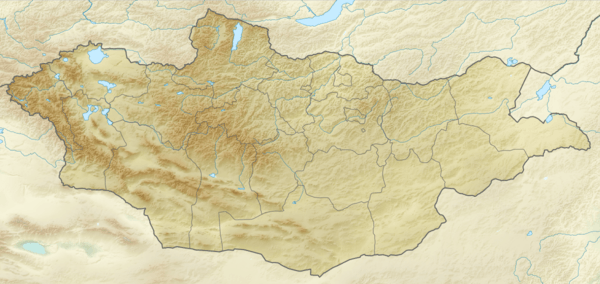Öösh Formation
The Öösh Formation, also known as the Tevsh Formation or Hühteeg Svita, is a geological formation of Lower Cretaceous strata in Mongolia. Dinosaur remains are among the fossils that have been recovered from the formation.[1] It overlies folded and metamorphosed basement strata of the Gobi region, and is capped by basalt. The succession is around 600 metres thick and consists of red claystones and sandstones, along with black thinly laminated shales. The claystones and sandstones were deposited as part of an alluvial fan system, while the shales were deposited in lakes present in the foot of the fan.[2] Many of the fossils come from the "Cannonball beds", which comprise the lowest 60 metres of the unit and consist of green siltstone.[2]
| Öösh Formation Stratigraphic range: Berriasian-Barremian ~141–125 Ma | |
|---|---|
| Type | Geological formation |
| Sub-units | Cannonball beds |
| Underlies | Basalt |
| Overlies | Basement |
| Thickness | 600 m (2,000 ft) |
| Lithology | |
| Primary | Sandstone, claystone, shale |
| Other | Siltstone |
| Location | |
| Coordinates | 44.2°N 102.7°E |
| Approximate paleocoordinates | 45.0°N 103.3°E |
| Region | Ovorkhangai |
| Country | |
 Öösh Formation (Mongolia) | |
Vertebrate paleofauna
Dinosaurs
| Dinosaurs of the Öösh Formation | ||||||
|---|---|---|---|---|---|---|
| Genus | Species | Location | Stratigraphic position | Material | Notes | Images |
| Asiatosaurus | A. mongoliensis | Teeth | Indeterminate sauropod | |||
| Prodeinodon | P. mongoliensis | Several teeth, fragmentary tibia, fragmentary fibula | Indeterminate theropod | |||
| Protiguanodon | P. mongoliensis | Reclassified as a species of Psittacosaurus, Psittacosaurus protiguanodonensis | ||||
| Psittacosaurus | P. mongoliensis |  Psittacosaurus fossil from the Hühteeg Svita with gastroliths in its stomach region, American Museum of Natural History | ||||
| P. protiguanodonensis | Junior synonym of P. mongoliensis | |||||
| Shanag[3] | S. ashile[3] | |||||
Mammals
| Mammals of the Öösh Formation | ||||||
|---|---|---|---|---|---|---|
| Genus | Species | Location | Stratigraphic position | Material | Notes | Images |
| Gobiconodon[4] | G. hopsoni[4] | Cannonball Member of Öösh Formation, possibly equivalent of Tevsh Formation | Two upper and lower jaws (PSS-MAE 140 (Holotype) & PSS-MAE 139) | |||
Pterosaurs
| Pterosaurs of the Öösh Formation | ||||||
|---|---|---|---|---|---|---|
| Genus | Species | Location | Stratigraphic position | Material | Notes | Images |
| Indeterminate Tapejaroid[2] | "Single vertebra"[2] | |||||
Squamates
| Squamates of the Öösh Formation | ||||||
|---|---|---|---|---|---|---|
| Genus | Species | Location | Stratigraphic position | Material | Notes | Images |
| Norellius[5] | N. nyctisaurops | "Nearly complete skull with mandibles and partial hyoid" | Gekkonomorph | |||
Color key
|
Notes Uncertain or tentative taxa are in small text; |
See also
- List of dinosaur-bearing rock formations
References
- Weishampel, David B; et al. (2004). "Dinosaur distribution (Early Cretaceous, Asia)." In: Weishampel, David B.; Dodson, Peter; and Osmólska, Halszka (eds.): The Dinosauria, 2nd, Berkeley: University of California Press. Pp. 563-570. ISBN 0-520-24209-2.
- Andres, B. and Norell, M.A. 2005. The first record of a pterosaur from the Early Cretaceous strata of Öösh (Övörkhangai; Mongolia). American Museum Novitates 3472: 1–6.
- Turner, A.S.; Hwang, S.H.; Norell, M.A. (2007). "A small derived theropod from Öösh, Early Cretaceous, Baykhangor Mongolia" (PDF). American Museum Novitates. 3557 (1): 1–27. doi:10.1206/0003-0082(2007)3557[1:ASDTFS]2.0.CO;2. hdl:2246/5845. Retrieved 2007-03-29.
- Kielan-Jaworowska, Z., Dashzeveg, D. (1998). "Early Cretaceous amphilestid ("triconodont") mammals from Mongolia" (PDF). Acta Palaeontologica Polonica. 43 (3): 413–438.CS1 maint: multiple names: authors list (link)
- Conrad, Jack L.; Daza, Juan D. (2015-08-28). "Naming and rediagnosing the Cretaceous gekkonomorph (Reptilia, Squamata) from Öösh (Övörkhangai, Mongolia)". Journal of Vertebrate Paleontology. 35 (5): e980891. doi:10.1080/02724634.2015.980891. ISSN 0272-4634.
This article is issued from Wikipedia. The text is licensed under Creative Commons - Attribution - Sharealike. Additional terms may apply for the media files.